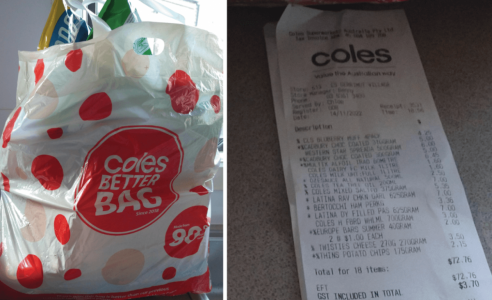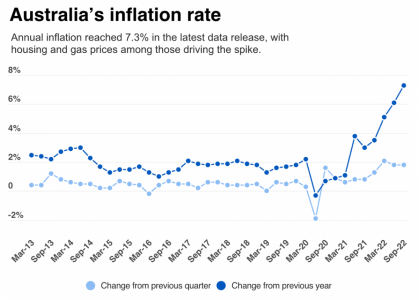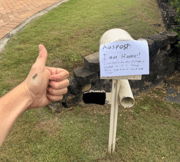Coles prices prompt cost-of-living conversations among Australians
- Replies 20
Aussies are no strangers to struggling to make ends meet. The cost of living is high, and it seems like every day, there's something else that we have to spend our hard-earned cash on.
So it's no wonder that people are starting to feel the squeeze more and more as prices continue to rise. A recent incident at Coles serves as a perfect example of this issue.
A photo was posted online of a receipt from a Coles shopper in Melbourne, along with the caption: 'Just put $72 of shopping into one bag. No item over $7. Everything's getting expensive...' The customer added that they're worried things 'will only get worse'.
The receipt reveals the shopper purchased 18 items, including muffins, Cadbury chocolate, chips, bread, butter, alfoil, milk, chicken, ham and Twisties – all items that would normally be considered fairly standard household groceries.
It just goes to show how quickly the cost can add up when you're shopping for your weekly essentials.

Sadly though, this person's experience is far from unique or isolated. Hundreds of others have taken to the Reddit post to share their own similar stories about how difficult it is making ends meet these days – especially when it comes to buying groceries and other necessary household items like petrol or utility bills.
'Two bags of shopping cost me $180 today. I used to fill the trolley with that,' one person wrote in the comments, with another responding and adding, 'The days of filling a trolley are over for me, especially this year. Now it's filling a basket for the same price.'
'We've been bulk buying rice and making almost every meal out of it. If it's not rice, then it's cheap noodles with frozen vegetables,' someone else said. 'That's the only way we're making it.'
'Groceries, utilities, fuel, interest rates, insurance, daycare – it never ends,' another wrote. 'We have had to stop the kids' extracurricular activities just to make ends meet. Can't remember the last time we ate out.'
Unfortunately, this problem is only going to continue to get worse before it gets better.
The Australian Bureau of Statistics reports that the CPI (Consumer Price Index) increased by 1.8 per cent in the third calendar quarter of 2022; this increase was driven mostly by a 4.5 per cent increase in the cost of fresh produce and a 1.5 per cent increase in the cost of meat and seafood.
The Australian Bureau of Statistics reported a 6.8 per cent jump in the price of dairy and associated products 'due to higher milk prices'. Prices for cereals and loaves of bread went up by 3.4 per cent, while those for miscellaneous groceries increased by 3.9 per cent.
'Strong price rises were seen across all food and non-food grocery products in the September quarter,' said the ABS.
'These increases reflected a range of price pressures, including supply chain disruptions, weather-related events, such as flooding, and increased transport and input costs.'

At the end of October, Coles told its suppliers to cut operational costs instead of asking for price increases. The supermarket giant warned them that even if they could prove their input costs had gone up, Coles might not agree to their request for a price increase.
The message came after a trading update showed that supermarket inflation at Coles was 7.1 per cent in the first quarter of the financial year, which was higher than the 4.3 per cent inflation in the fourth quarter of the previous year. Prices for fresh foods rose by 8.8 per cent.
Input cost requests from suppliers were mostly influenced by increases in the prices of raw materials, commodities, transportation, and fuel.
A third of Australians experience food insecurity, according to a report published by Foodbank last month, highlighting a growing issue in the nation.
Foodbank is the nation's largest food bank, and they're working around the clock to provide food to low-income Australians, together with a number of other front-line organisations.
Members, if you or someone you know is struggling to put food on the table, please do not hesitate to get in touch with them. Here are their contact information:
Foodbank QLD
179 Beverley St, Morningside QLD 4170, Australia
+61 7 3395 8422
Foodbank NSW & ACT
50 Owen St, Glendenning NSW 2761, Australia
+61 2 9756 3099
Foodbank SA
377 Cross Rd, Edwardstown SA 5039, Australia
+61 8 8351 1136
Foodbank VIC
4/2 Somerville Rd, Yarraville VIC 3013, Australia
+61 3 9362 8300
Foodbank WA
23 Abbott Rd, Perth Airport WA 6105, Australia
+61 8 9258 9277
Foodbank TAS
4-8 Sunmont St, Derwent Park TAS 7173, Australia
+61 3 6274 1052

Members, how are you finding the cost of groceries these days? Have you had to cut back on your shopping in order to make ends meet, or are you managing all right? Let us know in the comments below!
So it's no wonder that people are starting to feel the squeeze more and more as prices continue to rise. A recent incident at Coles serves as a perfect example of this issue.
A photo was posted online of a receipt from a Coles shopper in Melbourne, along with the caption: 'Just put $72 of shopping into one bag. No item over $7. Everything's getting expensive...' The customer added that they're worried things 'will only get worse'.
The receipt reveals the shopper purchased 18 items, including muffins, Cadbury chocolate, chips, bread, butter, alfoil, milk, chicken, ham and Twisties – all items that would normally be considered fairly standard household groceries.
It just goes to show how quickly the cost can add up when you're shopping for your weekly essentials.

A customer posted a picture of their shopping haul and said that their $72 could fit in just one bag. Credit: Reddit/SeaScreen5305.
Sadly though, this person's experience is far from unique or isolated. Hundreds of others have taken to the Reddit post to share their own similar stories about how difficult it is making ends meet these days – especially when it comes to buying groceries and other necessary household items like petrol or utility bills.
'Two bags of shopping cost me $180 today. I used to fill the trolley with that,' one person wrote in the comments, with another responding and adding, 'The days of filling a trolley are over for me, especially this year. Now it's filling a basket for the same price.'
'We've been bulk buying rice and making almost every meal out of it. If it's not rice, then it's cheap noodles with frozen vegetables,' someone else said. 'That's the only way we're making it.'
'Groceries, utilities, fuel, interest rates, insurance, daycare – it never ends,' another wrote. 'We have had to stop the kids' extracurricular activities just to make ends meet. Can't remember the last time we ate out.'
Unfortunately, this problem is only going to continue to get worse before it gets better.
The Australian Bureau of Statistics reports that the CPI (Consumer Price Index) increased by 1.8 per cent in the third calendar quarter of 2022; this increase was driven mostly by a 4.5 per cent increase in the cost of fresh produce and a 1.5 per cent increase in the cost of meat and seafood.
The Australian Bureau of Statistics reported a 6.8 per cent jump in the price of dairy and associated products 'due to higher milk prices'. Prices for cereals and loaves of bread went up by 3.4 per cent, while those for miscellaneous groceries increased by 3.9 per cent.
'Strong price rises were seen across all food and non-food grocery products in the September quarter,' said the ABS.
'These increases reflected a range of price pressures, including supply chain disruptions, weather-related events, such as flooding, and increased transport and input costs.'

The annual consumer price index inflation rate inched up to 7.3 per cent in September, the highest level in more than three decades. Credit: ABS.
At the end of October, Coles told its suppliers to cut operational costs instead of asking for price increases. The supermarket giant warned them that even if they could prove their input costs had gone up, Coles might not agree to their request for a price increase.
The message came after a trading update showed that supermarket inflation at Coles was 7.1 per cent in the first quarter of the financial year, which was higher than the 4.3 per cent inflation in the fourth quarter of the previous year. Prices for fresh foods rose by 8.8 per cent.
Input cost requests from suppliers were mostly influenced by increases in the prices of raw materials, commodities, transportation, and fuel.
A third of Australians experience food insecurity, according to a report published by Foodbank last month, highlighting a growing issue in the nation.
Foodbank is the nation's largest food bank, and they're working around the clock to provide food to low-income Australians, together with a number of other front-line organisations.
Members, if you or someone you know is struggling to put food on the table, please do not hesitate to get in touch with them. Here are their contact information:
Foodbank QLD
179 Beverley St, Morningside QLD 4170, Australia
+61 7 3395 8422
Foodbank NSW & ACT
50 Owen St, Glendenning NSW 2761, Australia
+61 2 9756 3099
Foodbank SA
377 Cross Rd, Edwardstown SA 5039, Australia
+61 8 8351 1136
Foodbank VIC
4/2 Somerville Rd, Yarraville VIC 3013, Australia
+61 3 9362 8300
Foodbank WA
23 Abbott Rd, Perth Airport WA 6105, Australia
+61 8 9258 9277
Foodbank TAS
4-8 Sunmont St, Derwent Park TAS 7173, Australia
+61 3 6274 1052
Key Takeaways
- The cost of living is rising at an alarming rate for many Australians, with some struggling to even put food on the table.
- One shopper was shocked at the cost of just one bag of groceries this week ($72), and this has sparked a discussion among Australians about the cost of living.
- Supermarket inflation is a major contributor to the rising cost of living, with prices of basic groceries and household items increasing at a rapid pace.
- To counter this, some Australians are bulk buying items such as rice and noodles to make their meals stretch further, while others have had to cut back on extras such as kids' activities and eating out.







